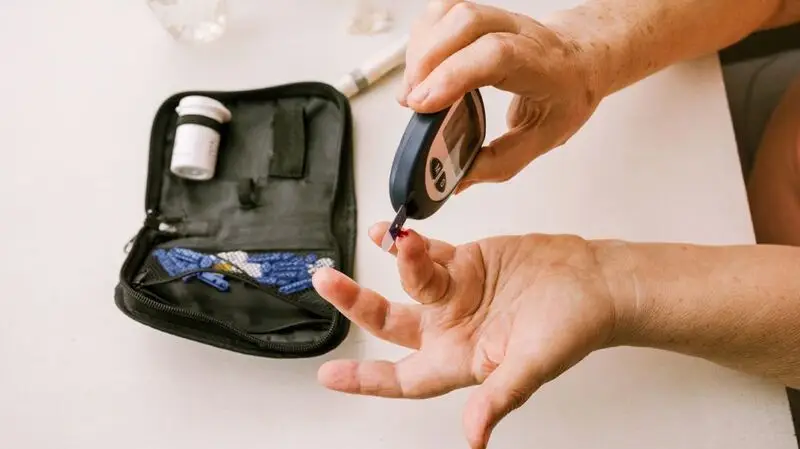
- As of 2021, researchers estimated that about 10.5% of the global adult population has diabetes, with 90% of that number having type 2 diabetes.
- Both obesity and type 2 diabetes are known risk factors for certain cancers.
- A new study has linked new-onset type 2 diabetes to an increased risk for developing certain obesity-related cancers, including colorectal, pancreatic, and liver cancers.
- This increased risk was greater in men than women, regardless of their body mass index (BMI).
As of 2021, researchers estimated that about 10.5% of the world’s adult population has diabetes, with 90% of cases being type 2 diabetes.
Obesity is a known
Now a new study presented at the European Congress on Obesity (ECO 2025) reports that new-onset type 2 diabetes may increase a person’s risk for developing certain obesity-related cancers, including colorectal, pancreatic, and liver cancer.
The study has not yet undergone peer review or appeared in print.
For this study, researchers analyzed data from participants within the U.K. Biobank. More than 23,000 study participants with new-onset type 2 diabetes were matched to over 71,000 other participants without the condition based on their body mass index (BMI), age, and gender, with an average follow-up of 5 years.
Scientists also searched for incidents of obesity-related cancers, including:
- bowel (colorectal) cancer
- endometrial cancer
- esophageal cancer
- gallbladder cancer
- kidney cancer
- liver cancer
meningioma (tumor in the central nervous system)multiple myeloma (blood cancer)- ovarian cancer
- pancreatic cancer
- postmenopausal breast cancer
stomach cancer - thyroid cancer.
“Research has shown that cancer-related mortality is increasing in people with type 2 diabetes and we want to help identify whether type 2 diabetes is causing cancer, or are the increased cancers in people living with type 2 diabetes due to the coexistence of obesity,” Owen Tipping, BSc, an MBPhD researcher at the University of Manchester and co-lead author of this study told Medical News Today.
“This can help with the creation of new potential cancer preventative measures and guide whether people with diabetes should undergo cancer screening,” Tipping explained.
“We decided to look at type 2 diabetes and obesity-related cancers because obesity has strong evidence for a causal association with at least 13 cancer types, but this is not so clear for type 2 diabetes. Type 2 diabetes and obesity are associated with similar cancers, and these conditions also often co-exist, making it difficult to decipher whether type 2 diabetes causes cancer, or whether it’s due to coexiting obesity.”
– Owen Tipping, BSc
At the study’s conclusion, Tipping and his team found that new-onset type 2 diabetes was correlated to a 48% increased risk of developing an obesity-related cancer in men, and a 24% heightened chance in women.
“The significance of this is that type 2 diabetes may increase risk of cancer independent of obesity, rather than it being solely due to obesity — i.e in the scenario where a person living with diabetes has a healthy BMI value,” Tipping explained.
Additionally, scientists found a link between new-onset type 2 diabetes and an increased risk for three of the researched obesity-related cancers.
Colorectal cancer risk increased by 27% for men and 34% for women, liver cancer chances almost quadrupled for men and increased five-fold for women. And pancreatic cancer risk almost doubled for women and increased by 74% for men.
“The significance of [these findings] is that whilst obesity is causally associated with these cancers, there is evidence from this study that type 2 diabetes is also associated — might be causal here, but more evidence is needed to confirm this,” Tipping said. “Cancer screening for people living with type 2 diabetes might be beneficial to detect these cancers early.”
“We plan to replicate this study in cohorts of different ancestry, to verify whether these findings are consistent across different populations,” he added.
MNT had the opportunity to speak with Anton Bilchik, MD, PhD, surgical oncologist, chief of medicine and Director of the Gastrointestinal and Hepatobiliary Program at Providence Saint John’s Cancer Institute in Santa Monica, CA, about this study.
“I found the study quite surprising since we know that there is a relationship between non-insulin dependent diabetes, obesity, and several cancers,” Bilchik commented. “And the fact that this study demonstrated a relationship between newly-diagnosed type 2 diabetes, obesity, and some cancers and not others was quite surprising to me.
“The study suggests and supports that there are other mechanisms involved in the development of certain cancers, such as hyperinsulinemia, inflammation, the microbiome, and that there are several possible causes other than those related to obesity,” he continued.
“I think that there need to be more prospective studies looking at patients that are obese that have type 2 diabetes versus those that don’t and monitoring them prospectively, measuring inflammatory markers, measuring
MNT also spoke with Jack Jacoub, MD, a board-certified medical oncologist and medical director of MemorialCare Cancer Institute at Orange Coast and Saddleback Medical Centers in Orange County, CA, about this research.
Jacoub commented that for him, it was still unclear how strong the link is between type 2 diabetes and the cancers discussed in the study.
“The obesity-related cancers and the lifestyle modifications that individuals can make to reduce that is probably the bigger message,” Jacoub explained. “It’s interesting, but I wouldn’t go out and tell every type 2 diabetic they’re at increased risk for X number of cancers and to worry about that.”
“I would just tell them to try to focus on improving their hemoglobin A1C and getting their sugar under control and their weight under control,” he advised.
“There’s been several data sets about trying to treat the insulin pathway or use the insulin pathway as somehow a benefit to patients with cancer,” Jacoub continued. “There’s a case of giving an anti-diabetic drug, metformin, in the case of breast cancer — it’s a very large trial going on — and others to see if there’s any possible way to impact it.”
“But it still always comes down to core principles for patients because there’s only so much in your control,” Jacoub added.





